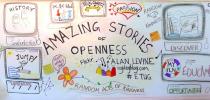BCcampus is supporting the Information Communications Technology (ICT) Collaborative Online Program in testing the open textbook waters with a pilot project this year. So far, the project has involved providing an online course, and investigating authoring tools for creating open textbooks from the various open educational resources (OER) found online.As BCcampus Client Service Manager Scott Leslie explained:
“The initial request was to find suitable open textbook replacements for the “Foundations of Web Development” course and two database courses, “Database Design” and “Database Management.” These are but three of 18 courses that make up the program, all of which have both course outlines and learning outcomes well described and existing commercial textbooks in use.”
 With open textbooks, ICT students could take advantage of course material using current technology: interactive models and multi-media components. Moving to open textbooks would minimize the cost of texts to families and students and create a financial saving for the ICT program. The current cost of the texts for these three, plus two other required courses is $371.91. With a projected enrollment in the program of 40 students and also an additional 100 students in face-to-face programs outside the ICT Collaborative, that’s an estimated cost saving of $52,000 annually to students.
With open textbooks, ICT students could take advantage of course material using current technology: interactive models and multi-media components. Moving to open textbooks would minimize the cost of texts to families and students and create a financial saving for the ICT program. The current cost of the texts for these three, plus two other required courses is $371.91. With a projected enrollment in the program of 40 students and also an additional 100 students in face-to-face programs outside the ICT Collaborative, that’s an estimated cost saving of $52,000 annually to students.
Bringing various OERs together into one textbook also makes sense to students and faculty in the program, as Scott Leslie found in his research:
“As my contact explained to me, students were themselves asking for a physical textbook to accompany their course in cases where one didn’t already exist. Fair enough. And in addition, while the instructors were well aware of the reams of materials available for free online and how they could simply point to these, increasingly they were tiring of the ever-present link-rot, finding that each term whole sections of their course would contain broken links due to the seemingly natural decay on the web. Hence – open textbooks!”
Scott has been researching the different technologies available for creating open textbooks and has documented his findings on his blog, EdTechPost
In the meantime, a four-week workshop on “Adopting Open Textbooks” is in its final week for a dozen or so faculty from the ICT and Applied Business Technology Collaborative Programs. Participants are discovering how to find open educational materials for re-use, how to work with stakeholders (including students) to promote a best-use model, and how to “share-alike” the results of an open textbook project. Everything from selecting resources to open licensing to using authoring tools has been covered.
Some feedback from the participants so far indicates:
- the workshop was very well-received;
- those in the workshop are in favour of open textbooks, but have found the issues of implemention are challenging;
- there is demand for a further session together where they will actually develop an open textbook. Most are looking at adopting and revising a textbook that they found – but they want to go through the process of writing a book together;
- participants found that using the term “open textbook” was confusing and caused issues with trying to get course approval. It is a textbook, no matter where it’s found or how it’s licensed.
- Because the adoption of open textbooks means change, participants see a need for policy direction from the top that supports open textbooks.
The ICT Collaborative has plans to expand its open textbook pilot project to five courses in the near future, providing resources are available. In addition, the Open Textbook Workshop will be refined, remixed and reused for other faculty in other programs. As far as BCcampus is concerned, open textbooks are an important part of the future of the Open Agenda.
